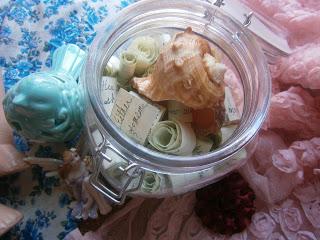I think a large part of our writer's toolbox comes from reading the works of other writers. Every time we sit down and read a book from start to finish, we are building our toolbox. It doesn't mean we remember everything we've read, but we store information in our brains for when we go to write our own stuff.
Are you the type of writer who likes to highlight or underline words or phrases in the books you read? Some people do this. My book by Sylvia Plath arrived in the mail yesterday. Johnny Panic and the Bible of Dreams. When I opened it up, I noticed someone had written inside on the first page.
I will never let you go unread. What a terrible fate that would be. This was one.
"The greatest enemy to creativity is self-doubt." Sylvia Plath.
There were also other writings inside by someone. And when I opened to one page where she had written about a storm, there were several small sticky note cut outs about what the person thought of the essay.
I am awed by Sylvia Plath's descriptions in the first two stories I have read so far. Mothers. And Ocean 1212-W I really liked reading this one. The descriptions are so vivid in my mind and I'm finding her work fascinating.
I've ordered The Bell Jar once again. I gave it away the first time as I couldn't bring myself to read it. I'm going to make myself read it. Last week, I wrote a poem based on Sylvia Plath. It ended up being four pages long and was the longest poem I have written. It's going to be the first poem in my newest poetry book I am working on.
There should be lots of other things in your writer's toolbox. I started creating one this last week. On an excursion to Family Dollar with my boyfriend, I discovered a cool mason jar just for this idea. I got it home and started writing ideas on a steno pad and began rolling them up and tossing them in the jar.
Note: When cutting my writing prompts off the paper, I cut towards me. A bad habit that stuck with me since early childhood. Everyone thinks it is funny.
I brought the jar to the library on the night I visited with my kids. Mollyanne and Julia had fun reading some of them.
Write anything that comes to mind and toss it in a jar, a box or anything else you want to put them in.
I also have one for poetry that is all kinds of words cut up on small art paper. Then, I can pull out seven or eight words and create a poem from it.
Some people like those magnetic words. I have that and use it once in a while.
Come back to your writer's box any time you want. Maybe you have a day when writer's block has set in. Go to the toolbox, fish out an idea and start writing.
Keep reading and building your toolbox so you have more to work with. Whenever you come across a word you don't know, look it up.
A writer's toolbox should also possess a thesaurus and a dictionary. Reference books are great. Also, build your collection of books on writing. It's all essential to being a writer.
Now write.
Jennifer Jo Fay
Copyrighted June 2017

